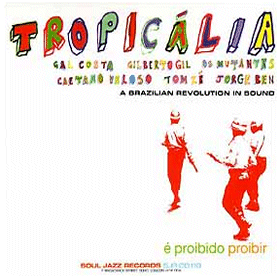Various Artists - Tropicalia: A Brazilian Revolution in Sound (Soul Jazz 2xLP)

As I write this review we're currently the 9th of June and it's been raining all week. Not exactly the most ideal setting to review one of the most wildly popular Soul Jazz complations in recent memory, "Tropicalia". This album demands to be played on the sunniest of sunny days somewhere off the coast of Emerald City.
Tropicalia, as a movement (musical and otherwise) is based around four key figures and one key group. They're all listed on the back of the album sleeve and they all feature exclusively on the album: Gilberto Gil, Caetano Veloso, Gal Costa, Tom Zé and Os Mutantes. Jorge Ben is also on the album (performing one song and as the composer of others), but he is more a contributor than someone central to the sound.
The liner notes for this album do an incredible job detailing the complex history of tropicalia so I'll try and summarize. Tropicalia, essentially, was birthed by Caetano Veloso and Gilberto Gil in 1967. The two were artists that had become disillusioned with the both the apathetic political left in Brazil as well as the music it was commonly associated with (initially bossa nova which began a decade earlier, and later MPB or Musica Popular Brasileira - an evolution of bossa nova, so to speak). Gil and Veloso's mission was to create a political and artistic spark by infusing MPB with international influences (both were were hugely influenced by the Beatles' "Strawberry Fields Forever" and the fact that John Lennon had written the song after taking LSD).
In 1967, Veloso and Gil presented their new sound at a televised music festival. Veloso performed with an Argentinean rock group called the Beat Boys while Gil sang with an upstart Sao Paulo rock band named Os Mutantes. The audience was composed mainly of complacent, left-wing, bossa nova-enthusiast students and they were horrified by Veloso and Gil's "bastardization" of MPB by combining it with international rock music. However it was this new breed of Brazilian pop music, combined with lyrics that were as surreal as they were political, that would form the backbone of the tropicalia movement's sound. The artists connected to this new genre would make appearances ("happenings") in the roles of provocateurs on MPB TV shows, spurring on the traditionalists of the genre and creating an even greater divide between the "old" sound and their new tropicalia music. In 1968 Veloso defined the movement when he released the album "Tropicalia ou Panis et Circences" featuring himself alongside Gil, Os Mutantes, Tom Zé, Gal Costa, arranger Rogério Duprat, sympathetic bossa nova artist Nara Leao as well as poets Capinan and Torquato Neto. Gilberto Gil and Zé also released their first tropicalia-informed solo albums.
In October of 1968, the collective may finally have pissed off the right people by performing under a flag depicting Rio criminal Cara de Cavalo, the first person killed by the government's new "death squad". Below his picture were the words "Seja marginal, seja heroi" (be a criminal, be a hero). A judge happened to be in attendance, took offense, and promptly shut down both the show and the night club. Those involved with the genre began getting the idea that they were flirting with danger, and they were right to be uneasy.
On December 13 1968, Brazilian president Costa e Silva introduced the Fifth Institutional Act (A-15) that proved to be the final nail in the coffin for both tropicalia (figuratively) and many Brazilians across the country (literally). Under this new act, political opposition to the military was outlawed, individual rights were suspended, and all press and culture was censored. Many unexplained disappearances, kidnappings, and deaths occured in the wake of this law.
Indeed Veloso and Gil were victims of the law, both being arrested on the 27th and sent to two months in solitary confinement, which no explanation given for their arrest. Eventually they were told they had to leave the country, and in July of 1969 they were deported to England. Just as quickly as tropicalia had begun, it was dead. In 1972 both men were allowed to return to their homeland, but the movement was long gone by that time. Ironically, Gilberto Gil is now the Minister for Culture in Brazil.
It's hard to imagine a sound lasting less than a year could have such a profound impact, not only on the culture it's native to but on the rest of the world as well. Listening to these 20 perfect psych/pop/avant-garde/bossa nova/MPB gems, it becomes evident that they are the byproduct of a very specific point in time in the history of a culture, and despite all the negative forces they were born out of, could never have been created under any other circumstances.
As an aside, most of the information in this review comes from the album's exhaustive liner notes, which also include some great photos from the time. Worth the price of admission alone!

0 Comments:
Post a Comment
<< Home